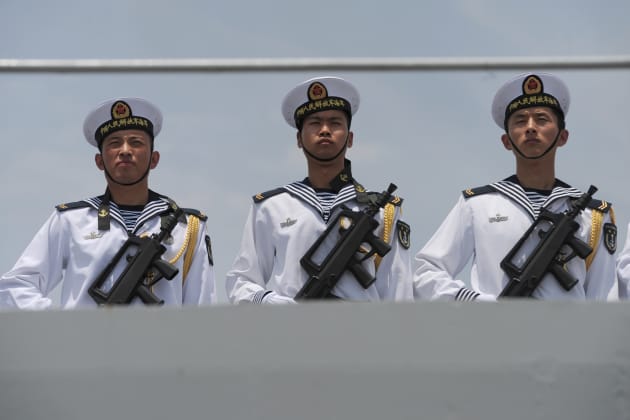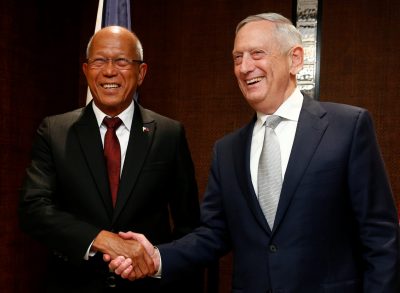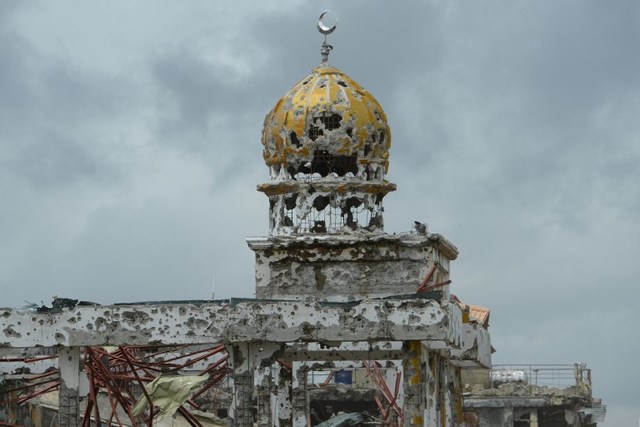The military on Tuesday identified the Filipino suicide bomber as Norman Lasuca, 23, one of two suicide bombers who attacked a military camp in Indanan town in Sulu, killing eight people and wounding 22 others on June 28.
The chief of the Western Mindanao Command, Maj. Gen. Cirilito Sobejana, said Lasuca’s parents identified him. A second bomber in the attack was described as a caucasian.
Earlier, authorities said the bomb attack Friday on a military base on the southern island of Jolo bore the hallmarks of a suicide attack.
Sobejana said the suspected bomber’s remains were identified by his mother and a sibling, but DNA testing was needed to confirm the preliminary identification.
Sobejana said investigators can’t entirely rule out the possibility the bomb was remotely detonated and the 23-year-old suspect, who allegedly has ties to jihadist group Abu Sayyaf, was merely carrying it.
“The probability that it was a suicide bombing is very high, but we also have to consider those possibilities,” he added.
If confirmed, the bomber would be the first known local suicide attacker in a nation where security officials had long said the tactic goes against local culture.
Defense Secretary Delfin Lorenzana said Monday the attack was “obviously a suicide bombing,” describing it as an important development in the nation’s restive south.
Insurgent groups have killed tens of thousands in their decades-long fight for a separate Muslim homeland in the Catholic-majority nation.
The Defense chief said Friday’s blast was the third suicide attack on the Philippines, following a July 2018 van bomb in southern Basilan island, and explosions during Sunday mass in January at a Catholic cathedral in Jolo.
All three attacks were claimed by the Islamic State group, which takes credit for the violence carried out by local affiliates such as kidnap-for-ransom group Abu Sayyaf.
Authorities have blamed foreign attackers for the two previous blasts, which killed more than 30 people.
Sobejana added the suspect was a member of the Abu Sayyaf faction led by Hajan Sawadjaan, who allegedly plotted the attack on the Jolo cathedral in January.
Abu Sayyaf has been blamed for some of the worst terror attacks in Philippine history, including frequent kidnappings of foreigners.
Members of the group have pledged allegiance to IS, including those who participated in the 2017 siege of the southern city of Marawi.
Analysts have said suicide attacks could be taking root in the Philippines, driven by IS influence.
“It is an escalation, but it’s also a sign of increased radicalization,” said Zachary Abuza, Southeast Asian security expert at the National War College in Washington.
Lorenzana agreed.
“This has raised the level of extremism here and I think we have a lot of work to do,” he said.
He added that they had to talk to the traditional leaders, the sultans, the datus, and also the Bangsamoro Autonomous Region in Muslim Mindanao to make the area peaceful so economic development can continue.
At the same time, Lorenzana said martial law is not the answer to every security threat, given that the attacks took place in Mindanao, where military rule prevails.
“Martial law actually is not the solution to all these because… we have not controlled the movement of people in Mindanao,” he said.
Lorenzana said they are still checking the extent of ISIS networks in the Philippines alongside with reports that Abu Sayyaf sub-leader Hatib Sawadjaan is the leader of IS-linked groups in the country.
Lorenzana said the security forces in Metro Manila and other urban centers nationwide have to be vigilant to prevent a repeat of the incident.
Metro Manila is still on heightened alert after Friday’s suicide attack in Indanan Sulu, regional police office director Guillermo Eleazar said.
“While the recent bombing case is being probed, we cannot relax our guard. Thus, all unit and station commanders, are strictly reminded to continue to secure all PNP headquarters and offices, vital installations, economic key points and places of convergence to guarantee that public safety concerns are checked and thoroughly supervised,” he said.
The difference between full and heightened alert is really minimal, Eleazar said.
Eleazar added that while there were no monitored terror threats in Metro Manila, the police remain vigilant and asked the public to do the same.
Meanwhile. police said a suspected member of the Al Qaeda terror group was arrested in a raid at a hotel in Iba, Zambales.
Police Col. Christopher Abrahano, regional chief of the 3rd Criminal Investigation and Detection Unit, identified the suspect as Cholo Abdi Abdullah, of Kenya, East Africa and temporarily staying at Rasaca Hotel in Iba town.
Abrahano said Abdullah was sworn in as regular member of Al Qaeda terror group sometime in 2012. He said the suspect’s group is operating in Eastern Africa.
Police said they found a 9mm caliber pistol, an improvised explosive device, a hand grenade and other bomb-making materials inside Abdullah’s hotel room.
Senator Panfilo Lacson, a former police chief, said a bill he filed would plug the loopholes in the Human Security Act of 2007 and give the government more tools to protect the public from terrorism.
“This bill aims to give the government an effective legal framework that would enable it to have a criminal justice response to terrorism,” he said.
Lacson, who headed the Philippine National Police from 1999 to 2001, had also played a key role in crafting the Human Security Act of 2007.
In his bill, Lacson noted that while Republic Act 9372 has been in effect for more than 10 years, gaps in the law prevented authorities from implementing it properly.
So far, he said the only conviction for terrorism under the 2007 law was the conviction of Nur Sapian by the Taguig City Regional Trial Court.
He added the occupation of Marawi City by the Maute Group in 2017 “showcased the gaps in the current law that leads to the conclusion that we still do not have an effective legal framework that can empower the government to address terrorism as a crime.”
Lacson’s bill defines and sets penalties against “terrorist acts” and removes the predicate crimes in defining terrorism.
Among the bill’s salient features include:
• Making recruitment and membership in a terrorist group a punishable act;
• A new provision regarding foreign terrorist fighters to give the statement that the Philippines cannot be used as a pit stop for foreign terrorists planning to commit terrorist acts here or abroad;
• Making providing material support to terrorists a punishable act;
• Addition of the regional trial court as a venue for securing judicial authorization for surveillance; and
• Longer period of judicial authorization for surveillance to give law enforcers more time to effectively gather evidence.
Under the bill, terrorist acts are punishable by life imprisonment without parole. Public officers found guilty of terrorist acts face perpetual disqualification from holding public office and forfeiture of their retirement benefits.
http://manilastandard.net/news/national/298806/-suicide-bomber-defies-ph-culture.html



















